
Route 66: Gallup
It’s amazing I didn’t crush the little guy.
He was such a tiny little animal—smaller than my camera and smaller than the stuffed toys they sold at Wal-Mart.
Zipped up inside my sweatshirt, the puppy barely moved, though he did stick is head out for a peek of the fluorescent-lit world of late-night shoppers that moved like zombies up and down the aisles.
It was eleven pm and besides my illicit puppy, I held a basket of fleece blankets, food bowls, pee pads, a pint of milk, some puppy kibble, and the smallest crate they sold. The little guy whimpered all the way back to the hotel, but I managed to sneak him up the grand staircase and into my room without getting caught.
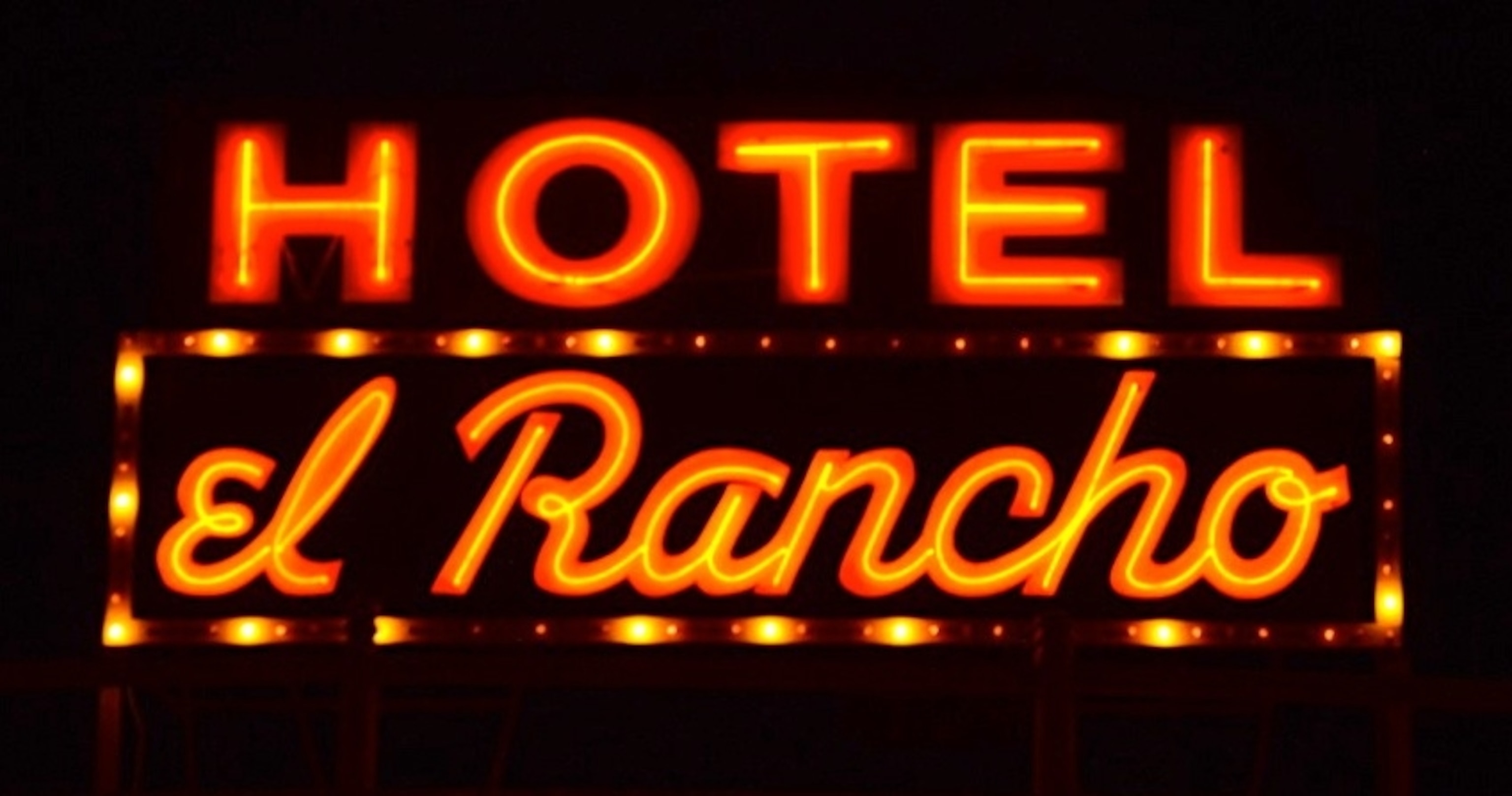
The El Rancho Hotel/Motel is where old Hollywood used to spend the night. Ronald Reagan, John Wayne, Errol Flynn, Humphrey Bogart and Burt Lancaster—Rita Hayworth, Doris Day, Mae West and Lucille Ball—They all drove Route 66 from California and they all lived at El Rancho while shooting their western scenes out in the nearby desert.
I’d shown up not knowing any of this—drawn from the highway by the neon filigree and the flashing H and M, changing the word Hotel to Motel back and forth, all through the night. A Navajo man with a heavy turquoise brooch checked me into my room, while right next to me, a large woman held her tiny puppy on the counter with a single hand, as if it was just a rolled up pair of socks.
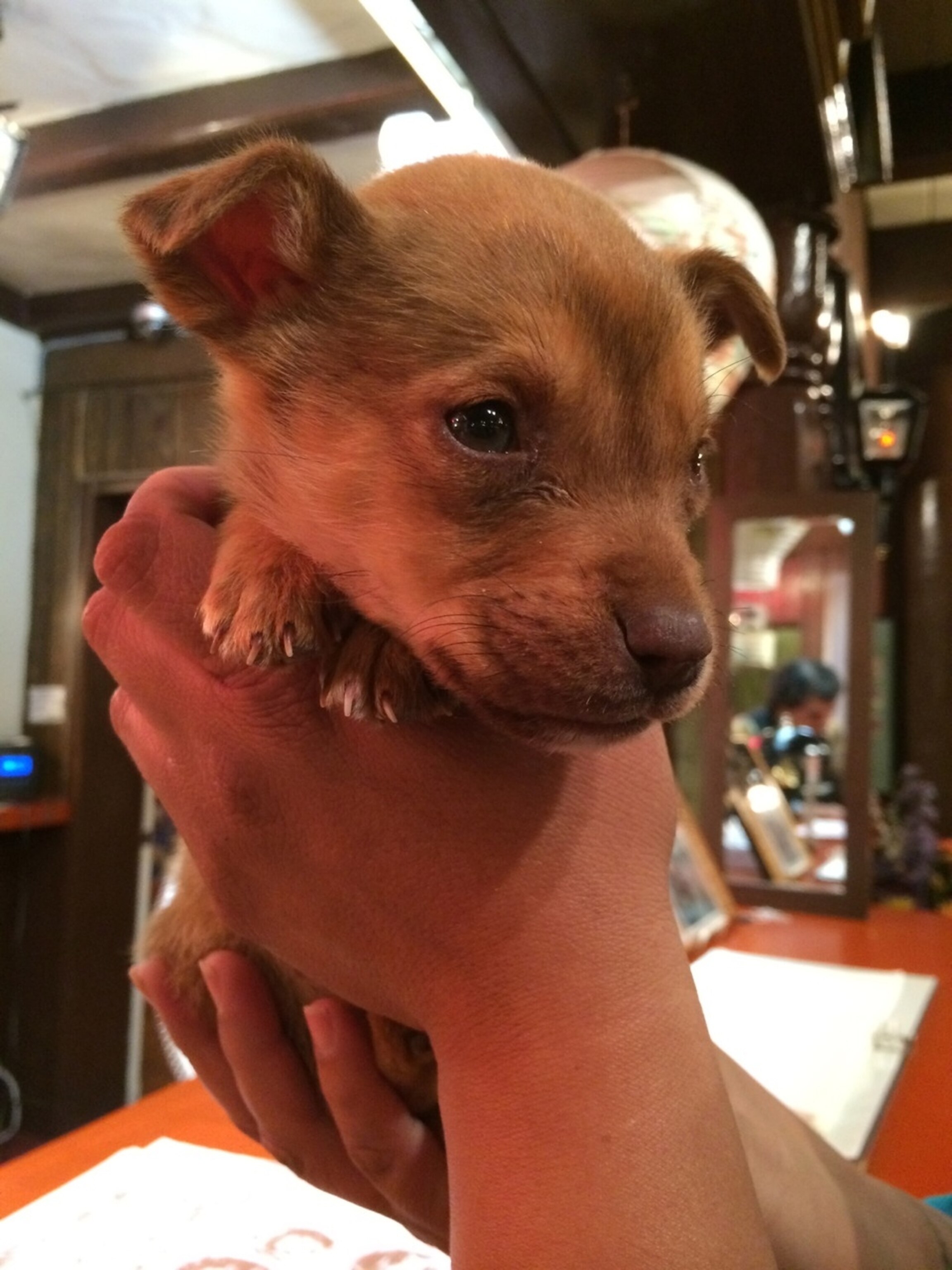
“He’s 7 weeks old,” she told me, flopping the weak dog towards me. His ears dropped down and his tiny black nose was wet, and his giant eyes stared up at me with the most penetrating glare. This dog was adorable, but he was not well—I could tell just by looking at him.
“There were eight in the litter,” the woman continued, “But the other seven died last night. It must’ve been too cold.”
My heart fell, and I held the puppy a little closer—the sole survivor in one unlucky litter. I didn’t ask the woman why she was leaving such young puppies outside in the freezing night of the high desert, or why she had taken them away from their mother so young. All over the world I see animals suffer, and people too. Whether or not we admit it, a big part of traveling is learning to not get too involved—turning away from the beggar, ignoring injustice, and ordering dinner while others go hungry.
The woman chuckled nervously and told me the puppy would surely die tonight, but I handed him back to her anyway and watched her walk away, back out into the cold. I wasn’t too sad—every night, dogs die all over the world.
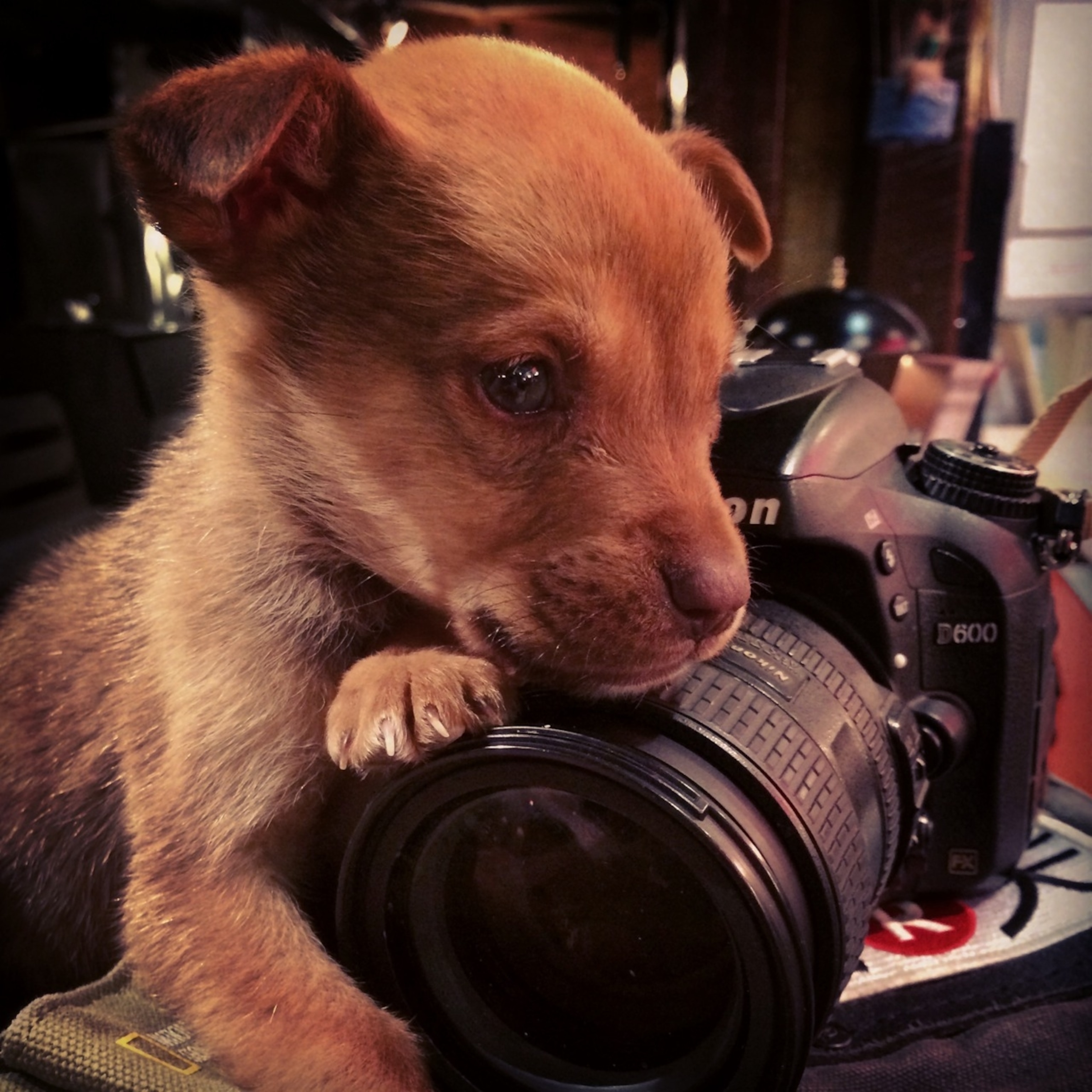
“Life is unfair,” I thought, again and again, all through dinner, which took too long and felt pointless. I had driven all day across New Mexico but I wasn’t even hungry. Only when I was back in my room, unpacking my suitcase into a closet where Spencer Tracy and Katherine Hepburn may very well have carried on their own affair, did it hit me like a gong—that little dog needed me.
I grabbed my keys, tore down the hall, down the grand staircase and out into the cold night. I asked strangers on the street if they had seen this woman with her dog, but nobody had. It took me an hour of asking around, but I eventually found her in her car eating fried chicken. The puppy was at her father’s house—outside, alone, in the cold.
“You can have him if you want, but he’s probably gonna die tonight,” she said. “I don’t want him.”
“Yes, I want him, please,” I said. So she brought me the dog and handed him over. My trip to Wal-Mart was a frantic spree to accommodate a sick puppy on the road, but none of the items I bought helped me cope with a dog who was vomiting on the floor of my hotel room.
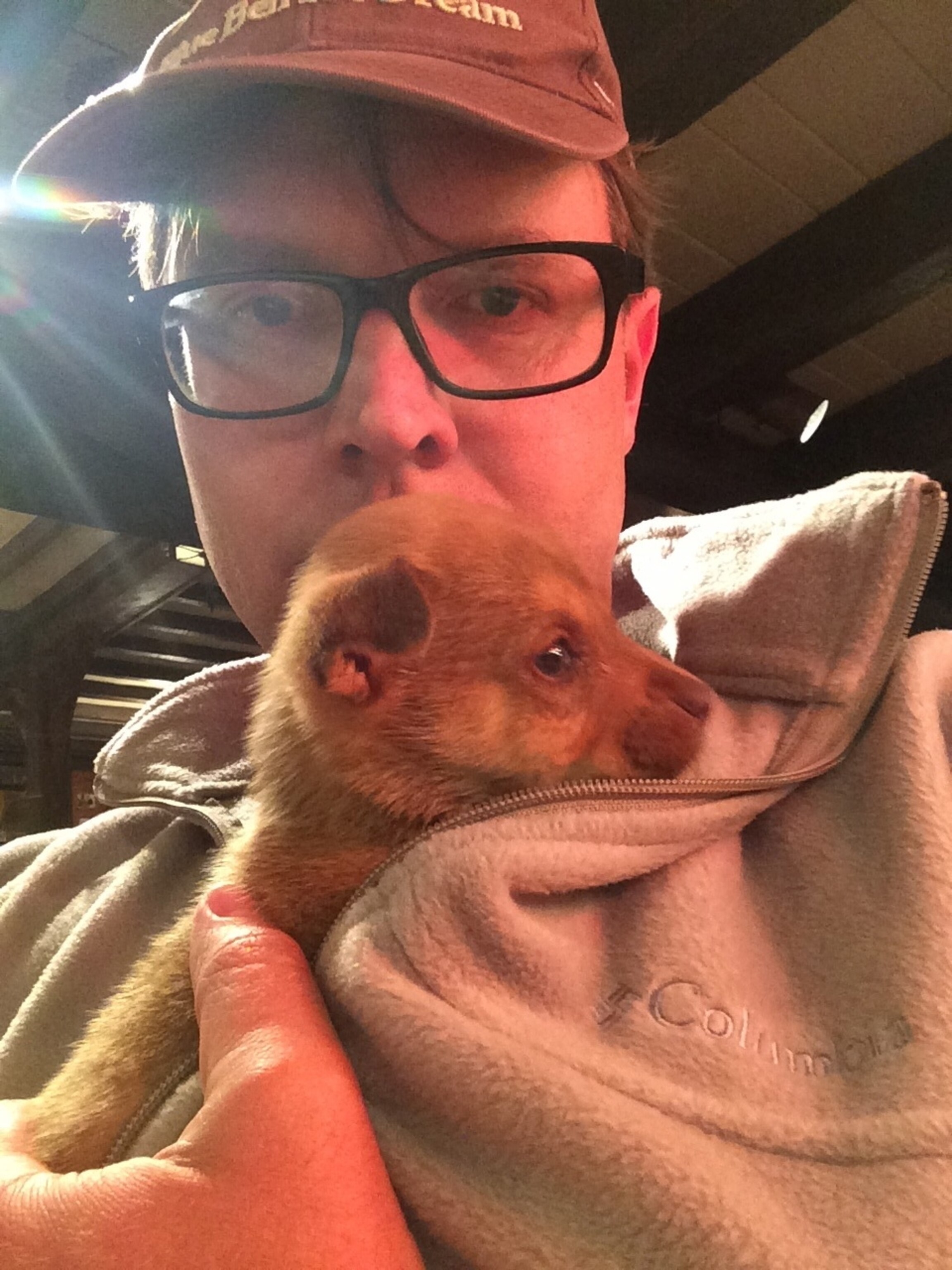
I cleaned up the mess, then gave the little man some water. He was a furry bag of bones, shivering as his tongue dabbed at the water. He turned away from any solid food and wandered dizzily until I brought him into bed.
I warmed his shivering body against my bare chest, and he nuzzled up into my neck, trying to suckle from my chin.
“I got nothing for you, kid,” I whispered in the dark, and prayed that somehow he would make it through the night. Every few hours he woke me up whimpering, and I set him down on the pee pad to relieve himself. His diarrhea was frequent and foul—I worried that he was already too dehydrated or diseased and that I had just signed up for the horrible end of a young dog’s life. But I kept at it, every hour I gave him some milk, then snuggled up with him, chatting with the little puppy and telling him that he was gonna be ok.
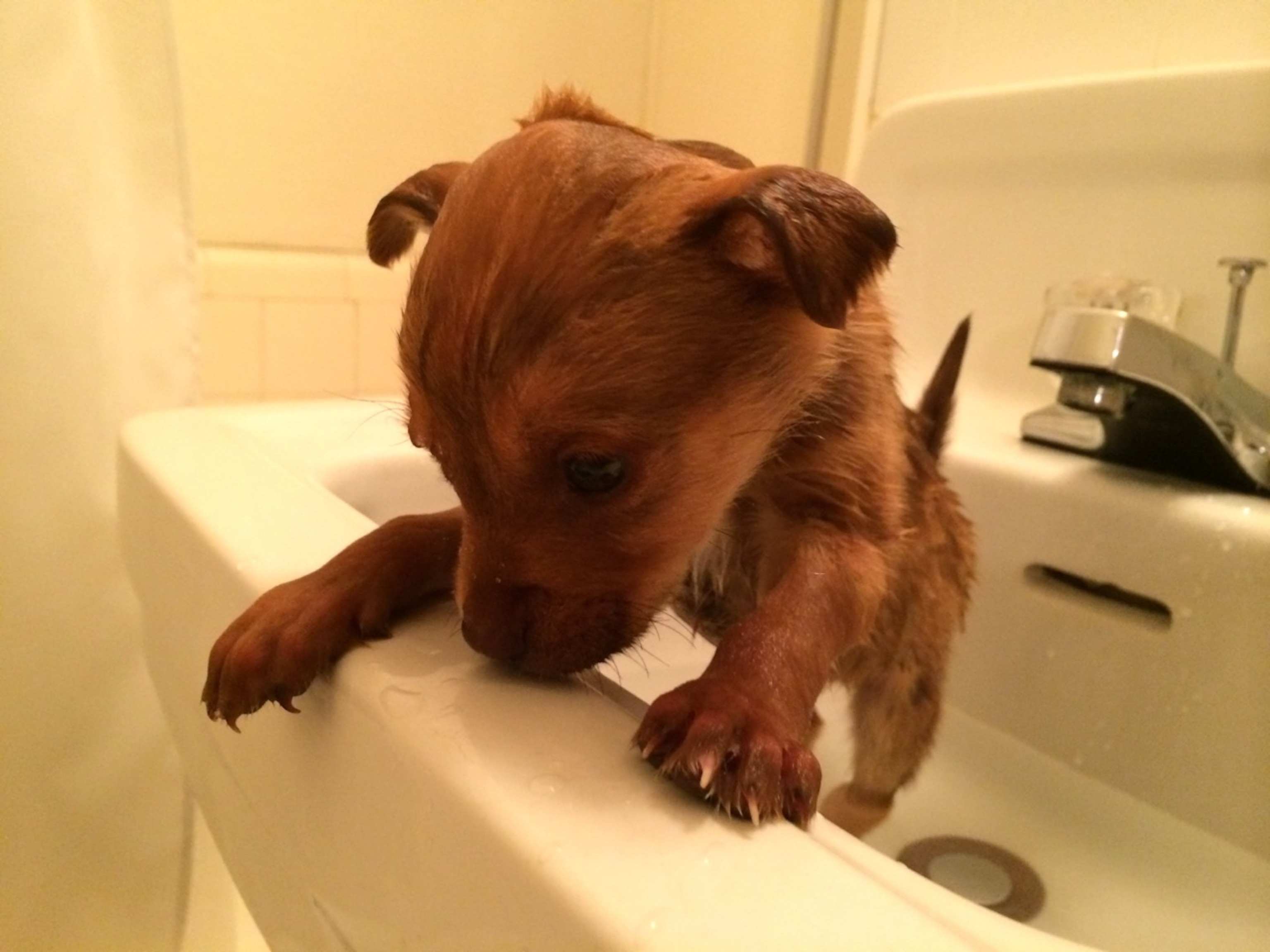
By the time I checked out the next day, I had cleaned up just about every kind of bodily fluid that flows freely from a sick animal, but after checking in with the local shelter, I decided to take the puppy with me. I was not going to just hand him over to be euthanized, no way.
So we carried on westward on Route 66, Gallup and I. He despised his crate and cried like a baby until I wrapped him in a blanket and stuck him in my lap. When the sun came up, he crawled out of his blanket and rested his head on my arm, staring at the window like any good traveler, warming his fur in the sunlight and blinking his glossy black eyes at the endless miles of yellow sand and sage brush.
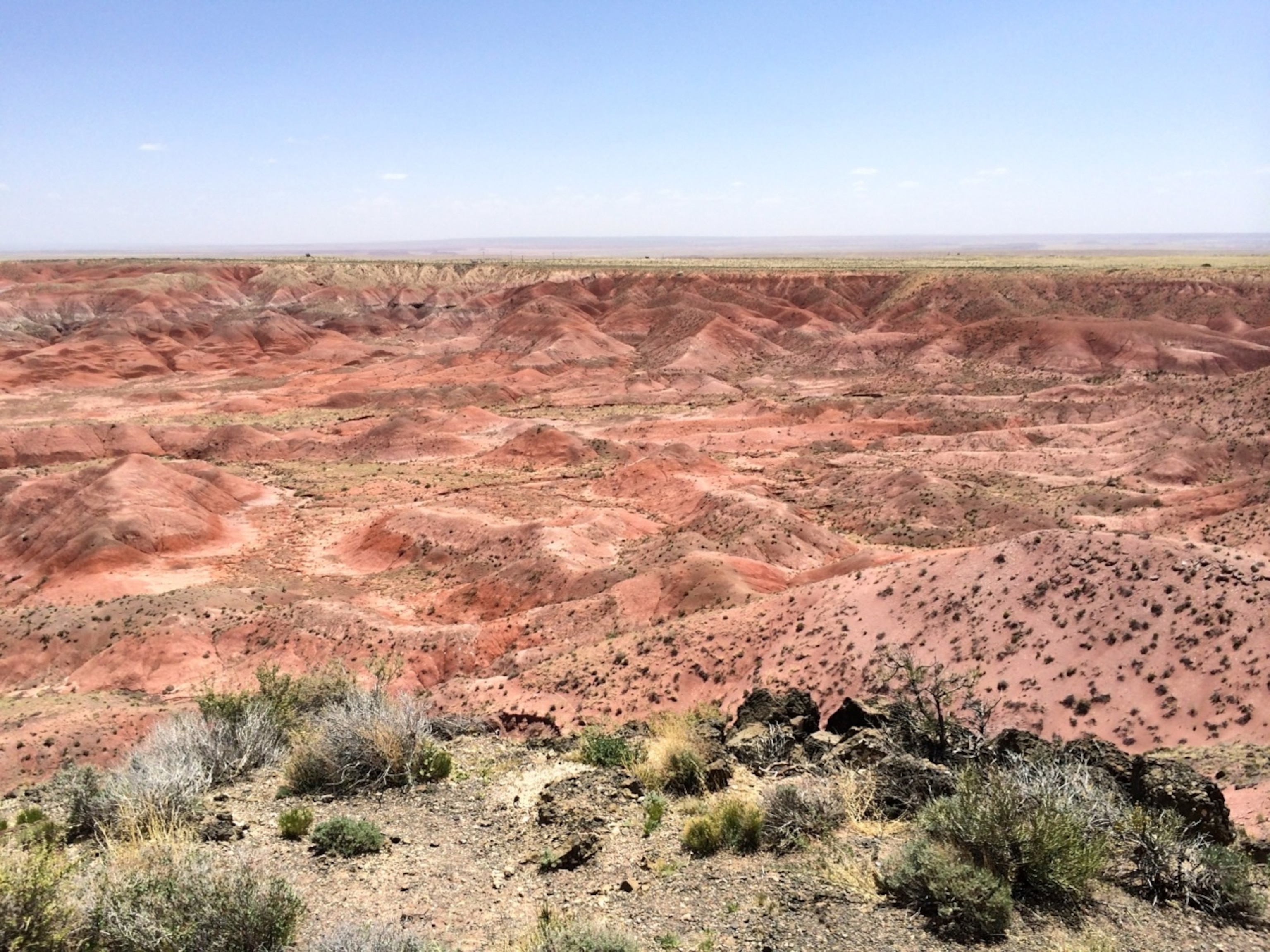
We crossed into Arizona, and I took him with me out into the Painted Desert. Gallup was small enough to stick in my jacket while I shot pictures of the glowing landscape as it transitioned from red to and pink. French tourists in convertibles offered to babysit him while I hiked down into the canyon, and I could hear their cooing sounds and surprised declarations, “Mais il est tout petit!” We drove another hundred miles, interrupted by sips of cool water and long moments parked on the gravel shoulder as I scribbled down notes.
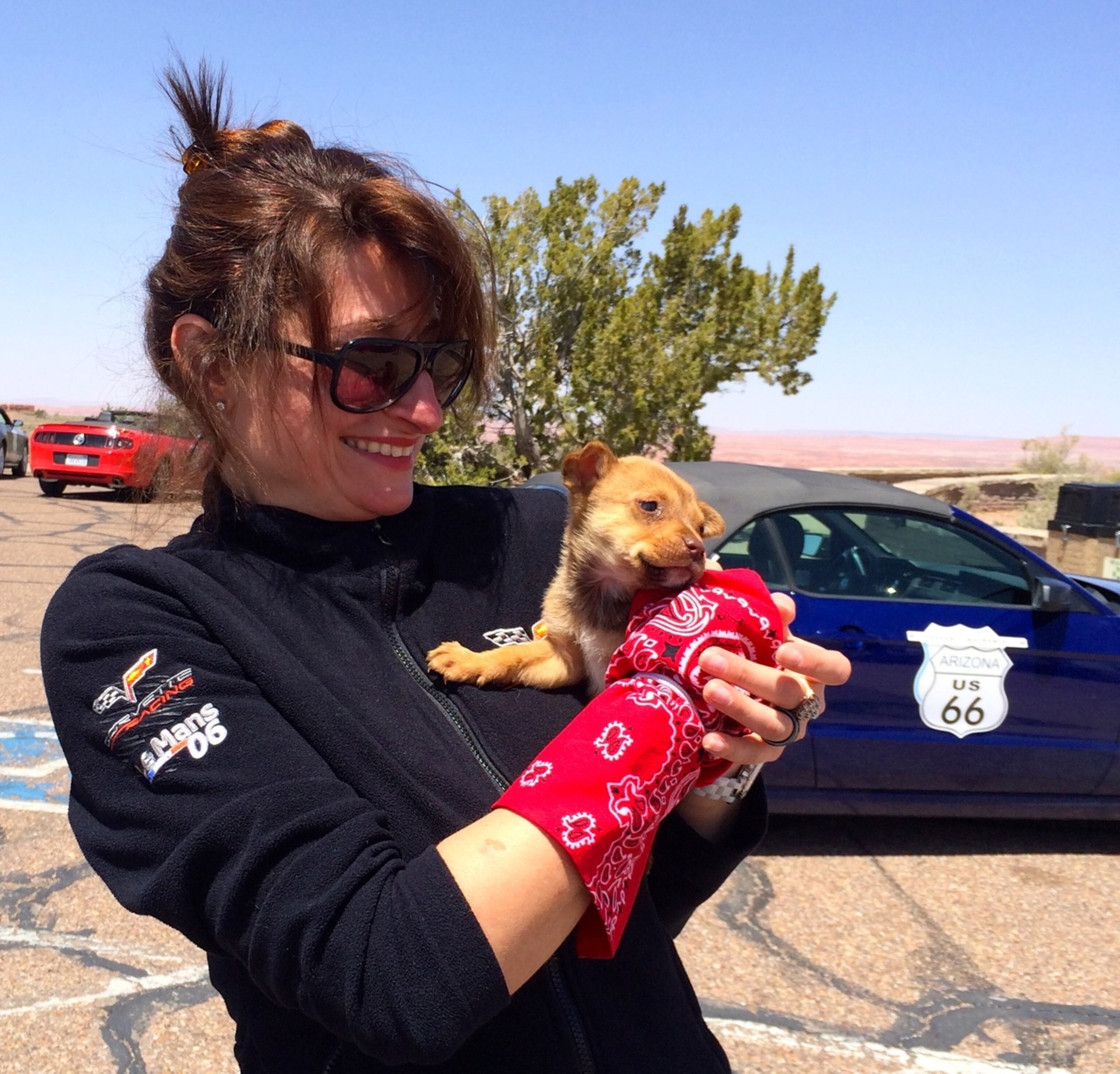
When we got to Holbrook, I tracked down the only veterinarian in the county.
“He’s young—maybe only six weeks,” she said, after finishing a full exam. “And he’s malnourished, and severely dehydrated, too.” She de-wormed him, then put him on a drip, pumping fluids and electrolytes into his little furry body. Gallup barely weighed one kilo (2.2 pounds), and the vet told me that if he was going to survive, he needed to eat. She gave me some food, and a bottle of puppy formula, and after checking into my next hotel, I tried feeding him.
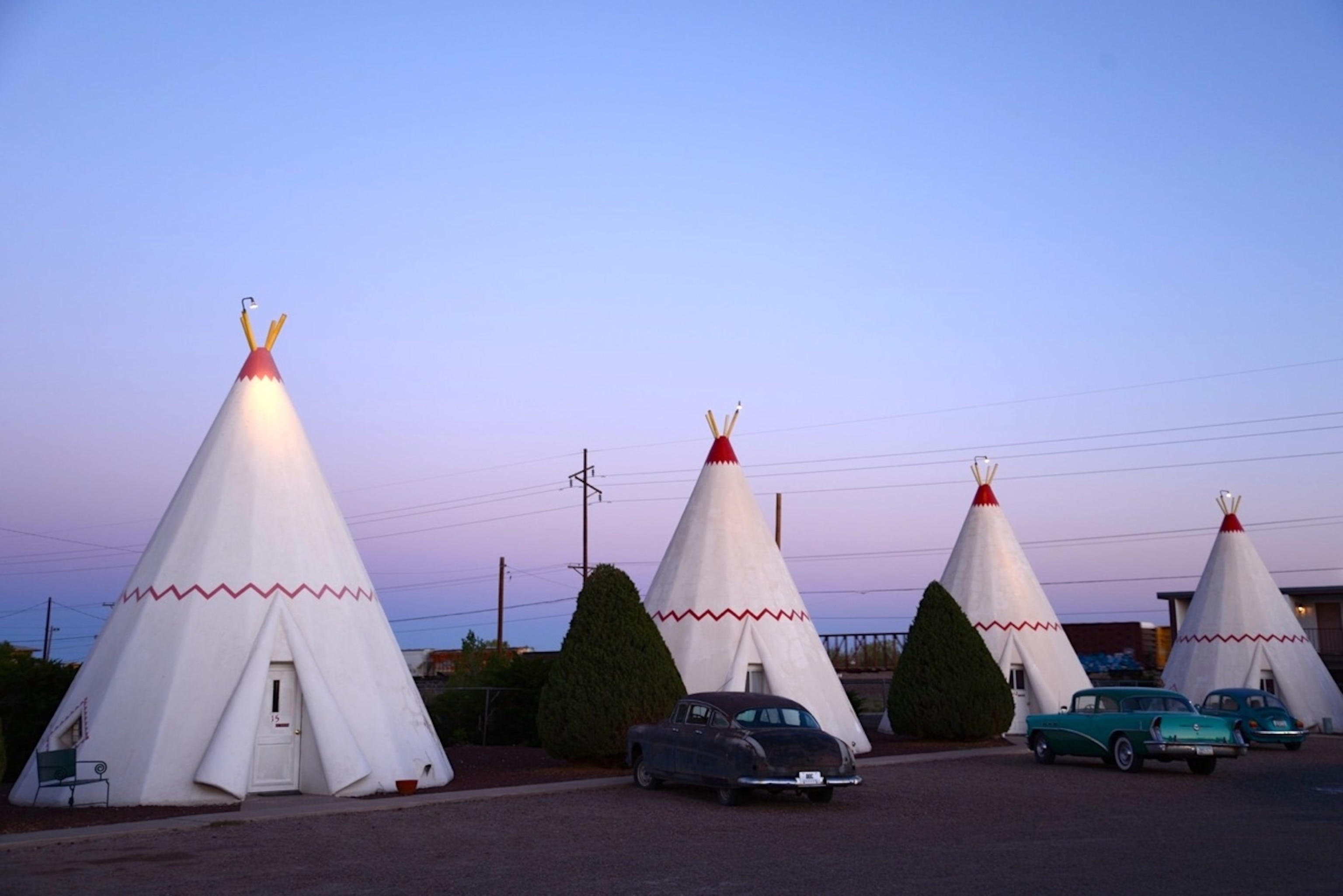
The Wigwam Motel consists of fifteen cement teepees lined up in a row, and Gallup followed me inside our new home, wagging his tail jauntily before vomiting up all the solid food he had just eaten. As I scrubbed away the mess, I was glad for the forgiving dark brown carpet of my fake teepee.
I kept him by my side for the rest of the day, which proved more difficult than I had imagined. Not everyone adored the puppy like I did—in so many restaurants and museums, people shook their head, “No,” but I was too worried to leave him locked in the car too long.
The one time I did—when I rushed into the grocery store for more puppy food, I returned five minutes later to find a puddle of brown on the driver’s side seat of my rental car with Gallup splashing merrily in the mess. I walked right back into the store for a double pack of paper towel and a bottle of Lysol.
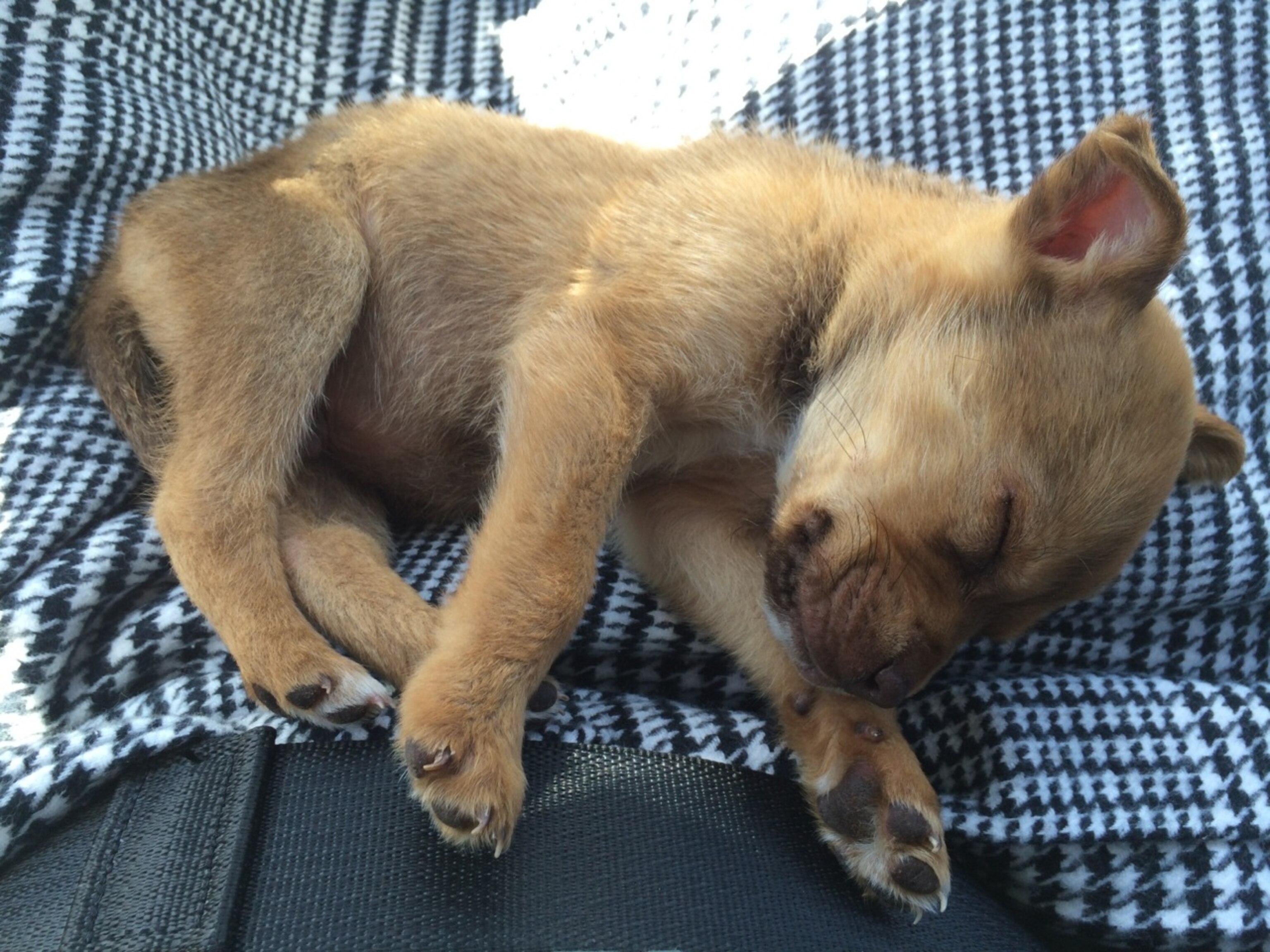
I had come here to travel Route 66, and not to soak up puppy poop, but there I was in Arizona, hunched over in a parking lot, amazed that such a tiny creature could produce such a massive mess. I was annoyed and by evening I grew worried—more and more fluid was coming out of Gallup, and so little was going in. I fed him his special puppy formula by the spoonful, and yet he grew dizzy and uncoordinated, stumbling over his feet and laying down on the floor, fatigued. His eyes turned glazed and distant and his limbs grew stiff.
As night fell, I accepted that my little dog Gallup was going to die.
I had done the best I could do—the only thing left was to make him warm and comfortable. I cleaned his fur, then wrapped him up in a fresh blanket and held him against my bare chest. In the darkness of the wigwam, I sang “Home on the Range” in a whisper until we both fell asleep.
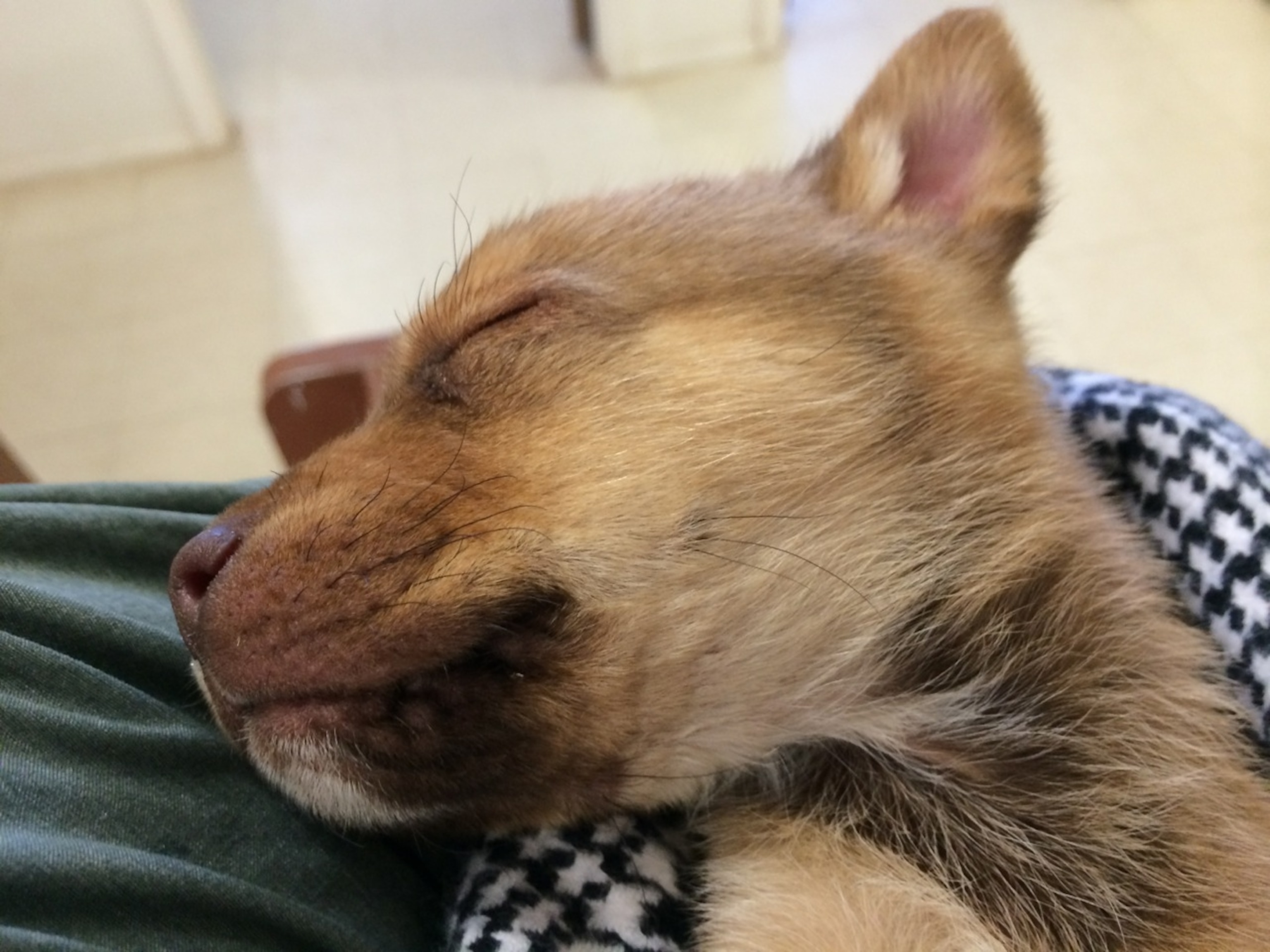
At midnight, I checked him, expecting a cold and lifeless body but found that he was still breathing, so I fed him a little more formula, then put him back against my chest. Every hour on the hour, I repeated the feeding until dawn, when he woke me up, whimpering.
The grungy little thing had lived, and he was hungry. He drank up the rest of the formula and then dove into a bowl of fresh water—he was thirsty! Suddenly he had the explosive energy of a puppy and he wandered outside, into the sun, exploring this strange world of teepees and tumbleweeds and old cars.
For two days, I had searched the internet to find Gallup a permanent home. I had an offer from a family in Texas and another in Utah, but the problem was getting him there. None of the airlines would accept such a young puppy, and especially a puppy that had no shots. Miraculously, he survived but I knew that he needed more attention than I could give him on the road.
All the way to Flagstaff I conspired of ways to get him home to Washington, DC, or to carry him with me to Los Angeles where I had friends who could watch him until he was old enough to travel. But I also knew I had at least another week living out of a car, stopping and starting in remote locations without any proper veterinary care available. Gallup had barely survived the night before, and I didn’t want to repeat the situation elsewhere.
For an hour I sat in my car making phone calls to every no-kill shelter in Flagstaff until I found one that offered to have a look.
“He’s 5 weeks old—or not even that,” said the manager at the Humane Society. “I can tell from his teeth, and his eyes. He’s just a baby,” she said.
A five-week old puppy and not even weaned, hence his inability to keep down any solid food. They told me that it was amazing he had survived at all, that he was too young to adopt out, but that they would foster him for a few more weeks until he could be adopted into a forever home.
“A puppy like that? He’ll be adopted in a snap.” Everybody wants a puppy but I didn’t want to let him go. Even after signing the paperwork and paying a donation for his care, I couldn’t let go of little Gallup. They kept reaching out to take him, and I just kept holding my little friend against my chest, fighting back tears behind sunglasses.
I’d barely had the mutt for 48 hours, but we had traveled two hundred miles across the desert, our two lives braided together on Route 66. The gift of travel is the strangers we meet along the way, and now, too soon, we were going separate ways.
I held him closely for another minute, then kissed Gallup on the nose before launching him into a pair of waiting hands. Just like that, my little puppy was gone, and as I drove down the hill of towering spruce, I admired the shocking blue skies of northern Arizona until I came to the next stoplight, where I waited for green and sobbed just a little bit.
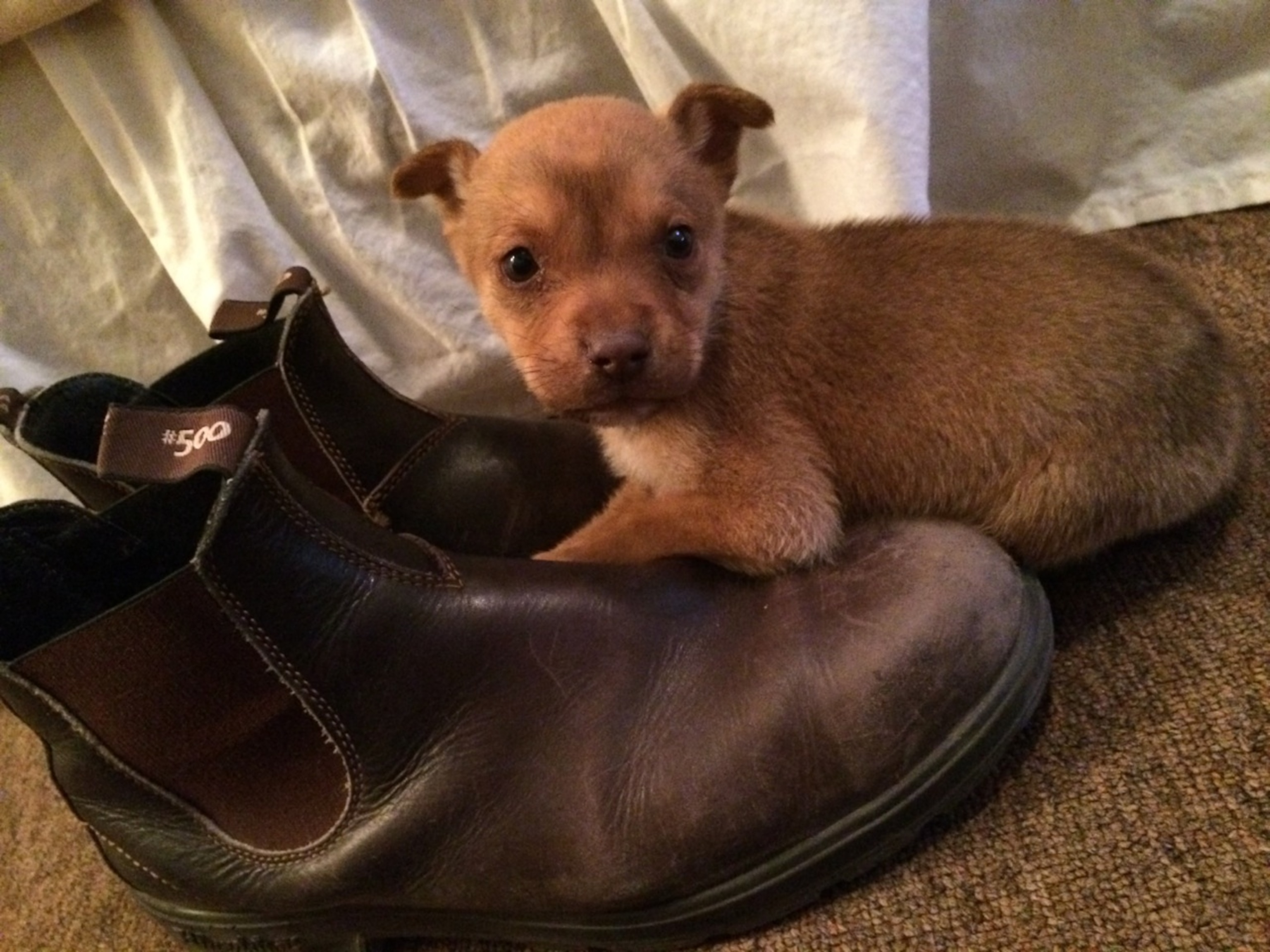
——————————————————-
P.S. Gallup is still with his foster mother in Flagstaff. He is healthy and growing up and will be available for adoption in the coming weeks. Any contributions should be made to the Coconino Humane Society, to whom I am especially grateful.